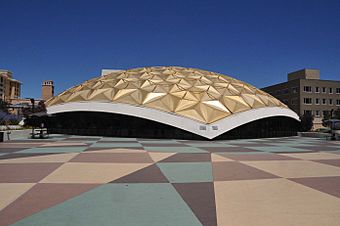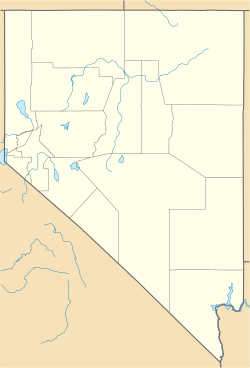Pioneer Center for the Performing Arts facts for kids
Quick facts for kids |
|
|
Pioneer Theater Auditorium
|
|
 |
|
| Location | 100 S. Virginia St., Reno, Nevada |
|---|---|
| Built | 1967 |
| Architect | Bozalis, Dickinson and Roloff; TEMCOR |
| Architectural style | Modern Movement, Geodesic Dome |
| NRHP reference No. | 04001528 |
| Added to NRHP | January 19, 2005 |
The Pioneer Center for the Performing Arts is a special building in Reno, Nevada. It's a place where people go to watch live shows, like plays and concerts. When it was first built, it was called the Pioneer Theater Auditorium.
This unique building was finished in 1967. It has a very cool, round, gold-colored roof that looks like a giant dome. Inside, there are 1,500 seats for everyone to enjoy the performances.
Contents
What Makes the Pioneer Center Special?
The Pioneer Center was designed by architects from Oklahoma City, Oklahoma. They created a strong concrete building with a shiny gold dome on top. This dome is known as a geodesic dome. It's a special type of structure made of many small, flat pieces that fit together to form a strong, curved shape.
The Golden Turtle Dome
The company that built the dome, Temcor, had a co-founder named Don Richter. He was a student of Buckminster Fuller, who invented the geodesic dome idea. Temcor had already built many gold-colored aluminum domes before this one.
People in Reno sometimes called the Pioneer Center's dome the "Golden Turtle." This nickname came from its round shape and golden color. The dome is made of 500 aluminum panels. These panels are supported by a steel frame, which rests on strong concrete arches.
How the Building Fits the Ground
A cool design feature is that the main seating area, called the orchestra level, is actually below the ground. This design allows the large dome roof to almost touch the ground at the building's corners. It makes the building look very connected to its surroundings.
History of the Pioneer Center
The idea for the Pioneer Center came from the Washoe County Fair and Recreation Board. They were very impressed by a similar domed building called Casa Mañana in Fort Worth, Texas. This inspired them to choose the unique dome design for Reno's new theater.
A New Name and an Old Statue
The building was almost named the Apollo Theater. However, it ended up being named "Pioneer" after a statue. This statue, created in 1939 by Byron S. Johnson, shows a pioneer family. It was saved from an old state building that was torn down to make space for the new theater.
A Historic Landmark
Because of its special design and history, the Pioneer Center for the Performing Arts was added to the National Register of Historic Places in 2005. This means it's recognized as an important historical site in the United States.
See also
 In Spanish: Centro para las Artes Escénicas Pioneer para niños
In Spanish: Centro para las Artes Escénicas Pioneer para niños
- Gold Dome, Oklahoma City, Oklahoma, also NRHP-listed
 | Dorothy Vaughan |
 | Charles Henry Turner |
 | Hildrus Poindexter |
 | Henry Cecil McBay |



